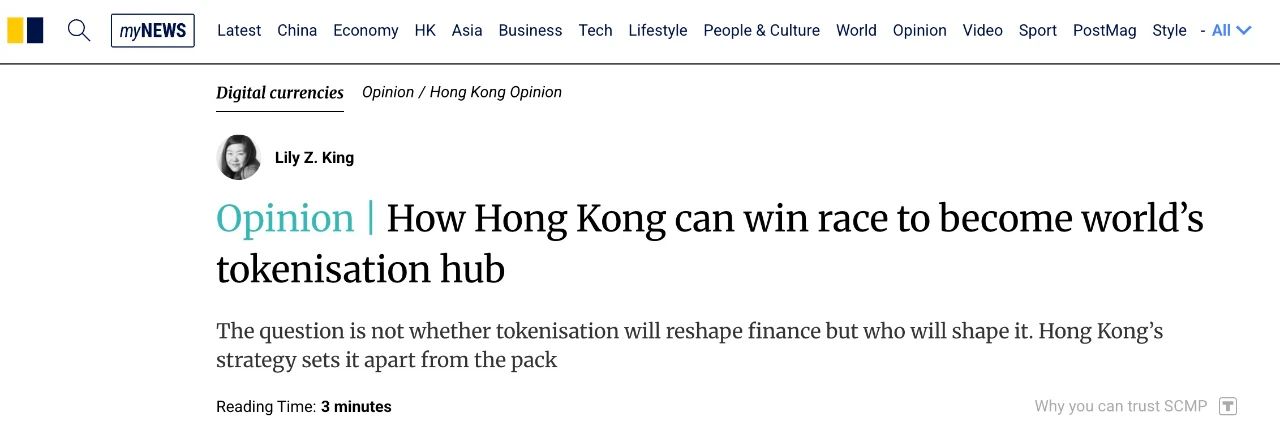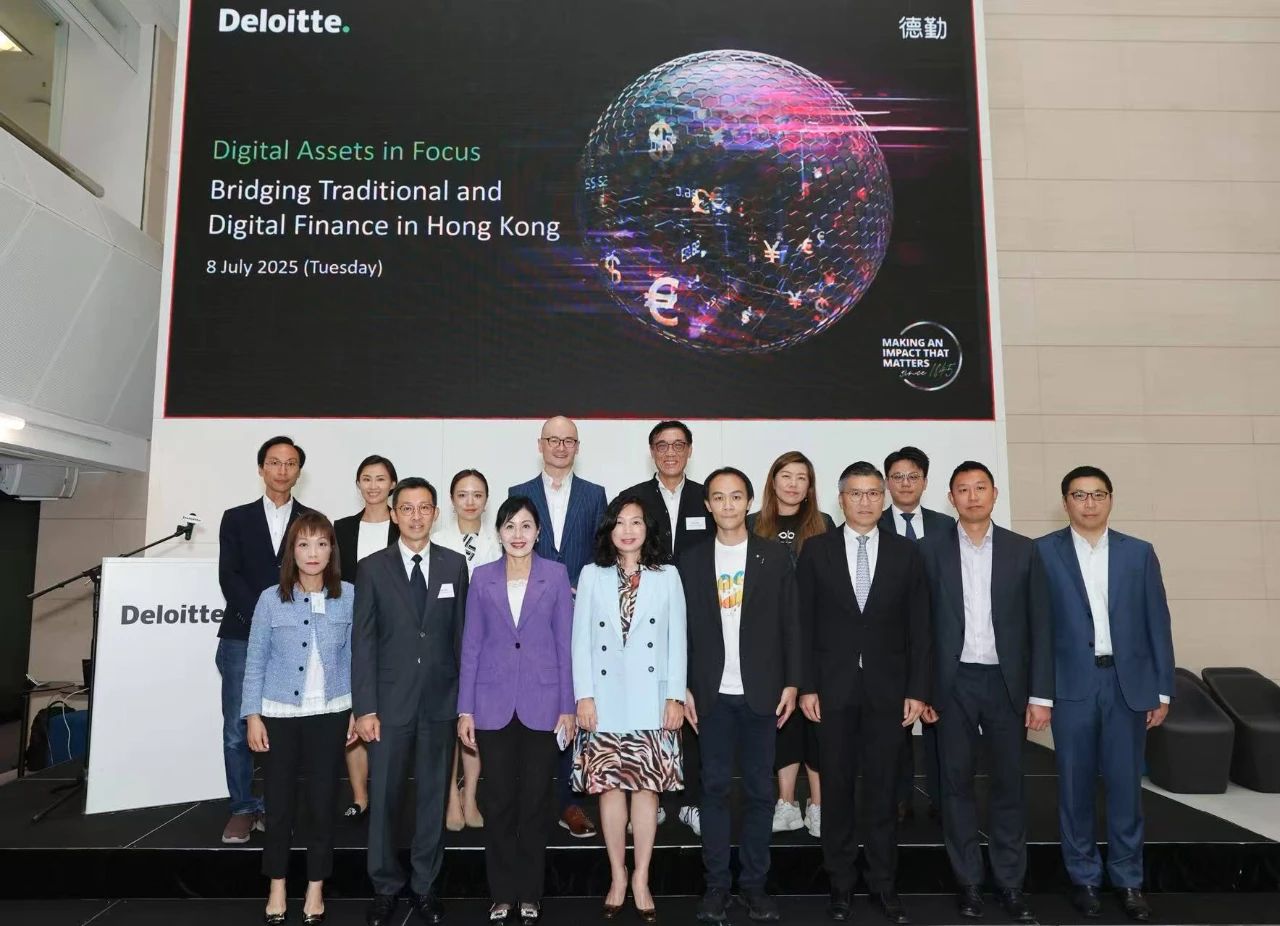Written by: Lily Z. King
Editor’s Note: An article by Cobo COO Lily Z. King was published on the South China Morning Post website on July 3, analyzing how Hong Kong is seizing the initiative in the global tokenization competition. The article points out that as real-world asset (RWA) tokenization accelerates into the mainstream, Hong Kong is building a new generation of financial infrastructure with a clear regulatory framework, open market strategies, and proactive policy innovations. In the second half of this competition, the key will no longer be policy direction, but whether products truly meet market demands.


On July 8, Lily Z. King at the Hong Kong Deloitte Digital Assets Forum
Participants included officials from Hong Kong's Financial Services and the Treasury Bureau, the Securities and Futures Commission, the Legislative Council, and the Monetary Authority, as well as industry organizations.
When Larry Fink, Chairman of BlackRock, wrote in his annual letter to shareholders, "Every stock, every bond, every fund—every asset can be tokenized," he was not predicting a distant transformation but rather describing a change that is already happening—an evolution that is reshaping the way capital is formed, assets are distributed, and financial opportunities are accessed.
At the core of this transformation is a concept that was once niche but is now rapidly entering the mainstream: real-world asset tokenization (RWA). Today, over $24 billion of RWA is circulating on public chains, covering yield-generating U.S. Treasuries, private credit pools, tokenized commodities, and real estate. What was once seen as a "crypto curiosity experiment" is now becoming part of the global financial infrastructure—the underlying plumbing of capital markets is quietly being restructured.
So the question is no longer whether tokenization will reshape finance, but who will shape it.
In the "Digital Asset Development Policy Statement 2.0" released on June 26, Hong Kong expressed its intention to lead.
The statement introduced the "Leap" regulatory framework, expanding the regulatory scope to include stablecoin issuers, custodians, and RWA platforms. More importantly, it sends a clear signal: Hong Kong is not just "allowing tokenization, but is actively advocating for it."
"Leap" is an acronym for "Legal and Regulatory Simplification," "Expand Tokenized Products," "Advance Application Scenarios," and "People and Partnership Development." It promotes a broader vision by establishing a stablecoin licensing system, clarifying the regulatory framework for tokenized ETFs, and continuing previous pilot projects in digital bonds and green finance, encouraging the tokenization of various assets from precious metals to renewable energy infrastructure.
Perhaps the most significant change lies not in what the policy specifically regulates, but in how it defines tokenization—viewing it as a core pillar of new financial infrastructure rather than a sandbox experiment. This alone sets Hong Kong apart from other markets.
In contrast, Singapore has taken a more cautious approach—focusing on institutional participation and restricting retail investors; whereas Hong Kong has chosen a broader, more inclusive path. It allows retail users to participate under clear suitability rules, expanding the potential market space.
Compared to the EU's regulatory framework for crypto assets and the fragmented regulatory tug-of-war in the U.S., Hong Kong offers a more unified, principle-based system, providing the clarity that innovators and investors need.
However, simply laying the tracks does not mean the train will run on time. Issuing a tokenized asset is easy; the challenge lies in whether anyone is willing to hold, trade, and trust it.

On June 5, Jeremy Allaire (third from left), CEO and co-founder of Circle Internet Group, one of the world's largest stablecoin issuers, and Heath Tarbert (second from left), President of Circle, at the New York Stock Exchange on the day of the company's IPO.
Photo: Reuters
Too many tokenization projects have learned this lesson the hard way: the technology is fine, but the market does not buy in. Lacking distribution channels, market demand, or real relevance, many products end up being shelved. The bottleneck is not in technology or regulation, but in whether real commercial value exists. The true test is whether a tokenized asset genuinely solves a problem for a clearly defined user group.
Of course, some projects have passed this test and successfully scaled. For example, tokenized U.S. Treasury products have gained widespread adoption among global savers due to their stable and transparent yields, especially in emerging markets lacking secure yield channels.
Similarly, protocols like Maple Finance have opened new paths in private credit by matching institutional borrowers with crypto-native lenders and achieving on-chain transparent risk control, making the products bi-directionally usable.
These successes do not stem from novel technology but from the perfect alignment of assets, users, and packaging.
The local ecosystem in Hong Kong is also evolving in this direction. The Hong Kong Monetary Authority's "Project Ensemble" is experimenting with tokenized bonds, funds, carbon credits, charging infrastructure, and supply chain finance scenarios. These projects hold significant potential, but a blockbuster project that can truly connect assets, audiences, and use cases on a large scale has yet to emerge.
All the elements are in place; what is needed next is "market traction." Hong Kong has laid a solid foundation: clear regulations, institutional recognition, and credible projects driven by public-private collaboration are continuously advancing. Hong Kong is increasingly seen as a safe and clearly structured digital asset experimental environment, and its potential as a "bridgehead" for China's digital asset strategy gives it significance far beyond the local market itself.
But the hardest part is just beginning. The next phase of competition will be determined by "product-market fit," rather than more policies. Can Hong Kong attract Southeast Asian savers to invest in truly yield-generating stablecoin products? Can it connect China's industrial assets to global capital through compliant digital packaging? Can it incubate a new generation of RWA products that are not only legal and compliant but also genuinely in demand in the market?
These questions will determine whether RWA is just a trend or can become a lasting transformation; they will also determine whether Hong Kong can become the global capital of tokenization in this new era. If successful, Hong Kong will not only be a leader but also one of the definers of future financial forms.
免责声明:本文章仅代表作者个人观点,不代表本平台的立场和观点。本文章仅供信息分享,不构成对任何人的任何投资建议。用户与作者之间的任何争议,与本平台无关。如网页中刊载的文章或图片涉及侵权,请提供相关的权利证明和身份证明发送邮件到support@aicoin.com,本平台相关工作人员将会进行核查。



